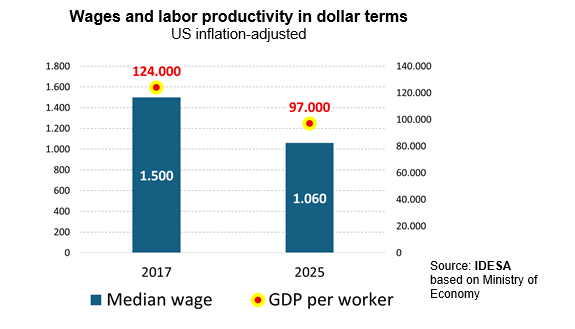Report Nº: 06/07/2025
Mercado Libre’s decision to differentiate online sales charges according to the tax burden applied by each province highlights another distortion caused by the provincial sales tax. Another reason why a super-VAT should absorb the provincial and municipal sales taxes.

Provincial and municipal sales taxes have countless flaws that VAT, for example, does not. One that goes unnoticed (even by most economists) is cross-subsidies between provinces. For logistical, commercial, or legal reasons, companies apply a single price for the entire country, even though the incidence of sales tax on their costs differs between provinces. This means that consumers in provinces with lower sales tax subsidize those in provinces with higher tax.
In order to make this distortion explicit, Mercado Libre announced that it will differentiate its online sales charges according to the tax burden applied by each province. Instead of a uniform commission, Mercado Libre will charge different commissions to reflect, at least partially, the differences in sales taxes among provinces. The announcement generated a strong reaction from the governor of Santa Fe. In his statement, he made two mistakes. The first is that he confused Mercado Libre (which pays sales tax on its sales charges) with Mercado Pago (which pays for financial activity). The second mistake is overlooking that charging a high tax rate on financial activity harms productive activity because it makes credit more expensive.
The fact is that Mercado Libre left its online sales fee structure as follows:
These data show how the application of a uniform price (in this case, the commission for using the platform that enables digital commerce) generates subsidies from provinces with lower taxes to provinces with higher tax pressure. The change in the cost structure applied by Mercado Libre seeks to mitigate the damage that a uniform commission throughout the country causes to sellers who use the platform from provinces with lower sales tax rates. They will no longer pay a higher commission to compensate sellers in provinces with higher tax pressure.
Provincial and municipal sales taxes have many negative effects. The most mentioned is the “cascade effect.” By being applied at each stage of production, without deducting what was paid in previous stages, the tax accumulates, inducing companies to integrate vertically, harming SME suppliers. But even more serious is that it is an obscure tax, as it is impossible to know precisely what its impact is on the final price of a product, and it is extremely cumbersome to administer. The provinces also force some taxpayers to act as tax collectors for free, forcing them to act as agents for collection, perception, and withholding. This increases administrative bureaucracy and forces most of the tax to be paid in advance. The most damaging side effect is that it generates credit balances for taxpayers that are difficult and sometimes impossible to recover.
Mercado Libre is not the first to rebel against provincial sales tax. A few months ago, Banco Nación threatened La Pampa to withdraw its branches if it did not retract the increase in sales tax rates. Many companies stopped selling to customers domiciled in Misiones to avoid the province’s abusive application of advance payments in the sales tax, which results in substantial unrecoverable credit balances. Municipal taxes have similar flaws. Some banks offer lower costs to their customers with tax domicile in the district of Tres de Febrero because it applies lower tax pressure. Banco Nación stopped operating in La Matanza in response to high municipal tax pressure and has filed lawsuits against several municipalities in the country.
These business reactions do not solve the problem. They only make it explicit. They are merely costly and difficult to implement. However, they show the necessity to push for a more disruptive change to a solution. This is for “Super-VAT” absorbing provincial and municipal sales taxes.